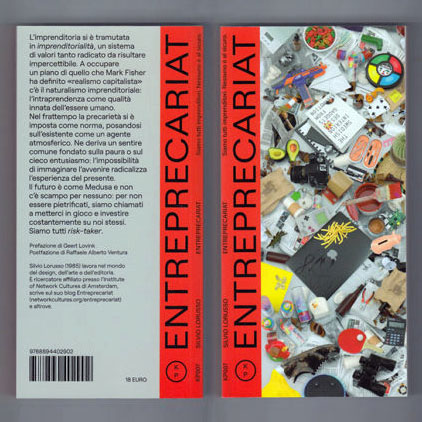On Wednesday, 10/07 at 6pm PST we meet to discuss the first section (“Core Values”) of Silvio Lorusso’s (2019) Entreprecariat.

With no apologies, Lorusso unrolls the entrepreneurial ideology that thinly veils its actually-existing counterpart: precarity. The notion of precariousness has long accompanied accounts of temporary work, migrant labor, and more recently, the “gig economy” and the “uberization” of the (non)labor force. In his (2017) General Theory of the Precariat Alex Foti, makes the case that the best chance at a universal rallying cry we have in the age of digitalization, culture wars, mass migration, and climate crisis may very well be replacing Marx’s moldy proletariat with the precariat.
The precariat is an internally divided class-in-the-making
that consists of a “multitude” of insecure denizens with a limited range of social, cultural, political, and economic opportunities. They live bits and pieces of lives, moving in and out of short term jobs. In contrast to the proletariat, the precariat’s relations of production are defined through partial involvement in labor and lots of ‘work-for-labor’ like the sort of self-advertisement that goes on on social media. The precariat is largely opportunistic, precisely for a lack of belonging to professional and craft communities. Their vulnerability puts them at risk of being lured in by neo-fascists in the US, Sweden, Finland, France, Japan, and Great Britain.
As entrepreneurs, girl bosses, and hustlers, these things surely do not apply to us. We choose our infinite productivity, our delightful attitudes and opinions, ever tweeted, and we certainly enjoy the rush of meeting new people and engaging new projects.
Or do we?
Let’s hash it out on Wednesday. And, fear not, pictures and quips abound in this concise and lovely publication.
Download a PDF of Entreprecariat via Monoskop here.